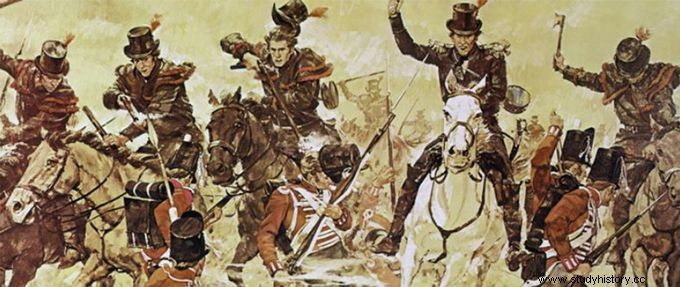
Political and military chaos marked the beginning of the seventeenth century for Tecumseh, a Shawnee warrior. Although Britain had surrendered in the Revolutionary War, naval clashes continued and the kidnapping of American soldiers kept tensions tight across the Atlantic. On another front, Britain fought France in the Napoleonic War, reducing the number of troops left in British Canada to hold back land-hungry American progress.
Native nations on the east coast and plains varied greatly in their response to the western settlers. Since the 16th century, French, Spanish and British colonizers had traded, contracted and lived among indigenous nations, but rarely with lasting peace. As the Revolutionary War raged on, the sense of Native American resistance grew. To protect native sovereignty, the Shawnee nation, along with several other nations, fought with the British to weaken American demand for land.
In 1780, US General George Rogers Clark led an attack on a Shawnee tribe near Mad River, Ohio. The Battle, known as the Battle of Piqua, continued a pattern of retaliation between American colonialists and British-backed natives. Shawnee left the capital village of Piqua, home to over 3,000 Shawnee.
Early life in Tecumseh
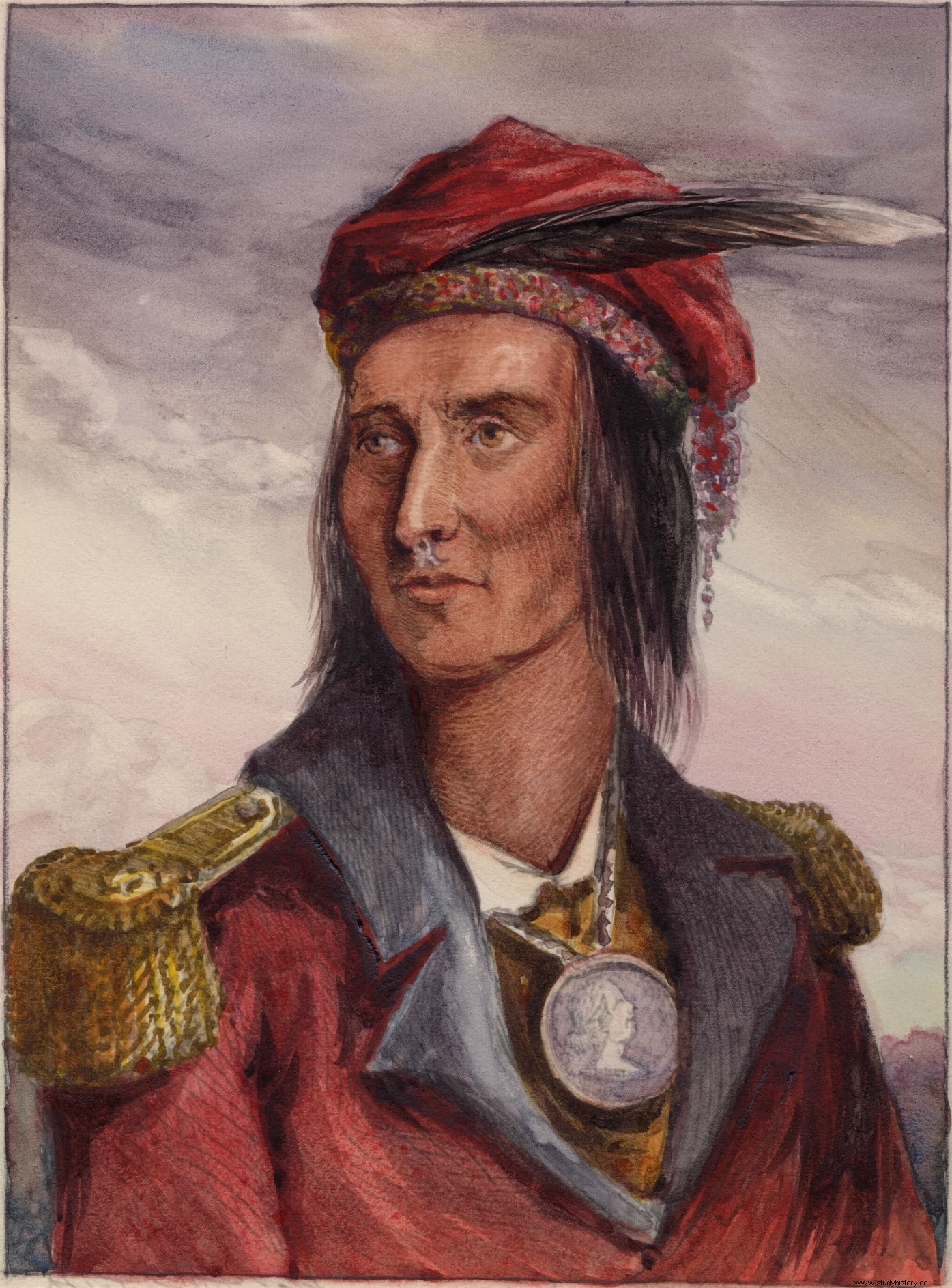
Among the fleeing Shawnee was Tecumseh, whose name means shooting star. Oral history tells that a comet passed over his head the night he was born. He was born in 1768, in a time of peace for Shawnee. His father was Chief Puckeshinwau, who five years earlier had joined a confederation of 14 native nations that recaptured British forces and reclaimed territory around the Great Lakes. The British had lost control of the plains, but not for long.
The year Tecumseh was born, the Iroquois Confederacy, which fought alongside the British during the Revolutionary War, sold the precious Ohio hunting ground to Britain. Threatened by the invading settlers, Shawnee prepared to defend his country. In 1774, Tecumseh's father died at the Battle of Point Pleasant, and the British captured the hunting grounds. Six-year-old Tecumseh now relied on his older brother, Cheeseekau, to raise him as a Shawnee warrior.
As the boy grew, he witnessed the devastation and brutality that accompanied the American militia. Hundreds of acres of crops burned at the hands of the embittered colonists, and Shawnee never lived far from conflict with the expanding settlers. He abhors American violence and the unnecessary destruction of villages and crops. Instead of taking an equally barbaric view, however, Tecumseh began to speak out against torture and useless murder. As he grew older, he surpassed many of his peers in hunting and fighting, but also in oration. His silver tongue and quick mind would later win him the loyalty of thousands of other warriors.
Tecumseh's dream
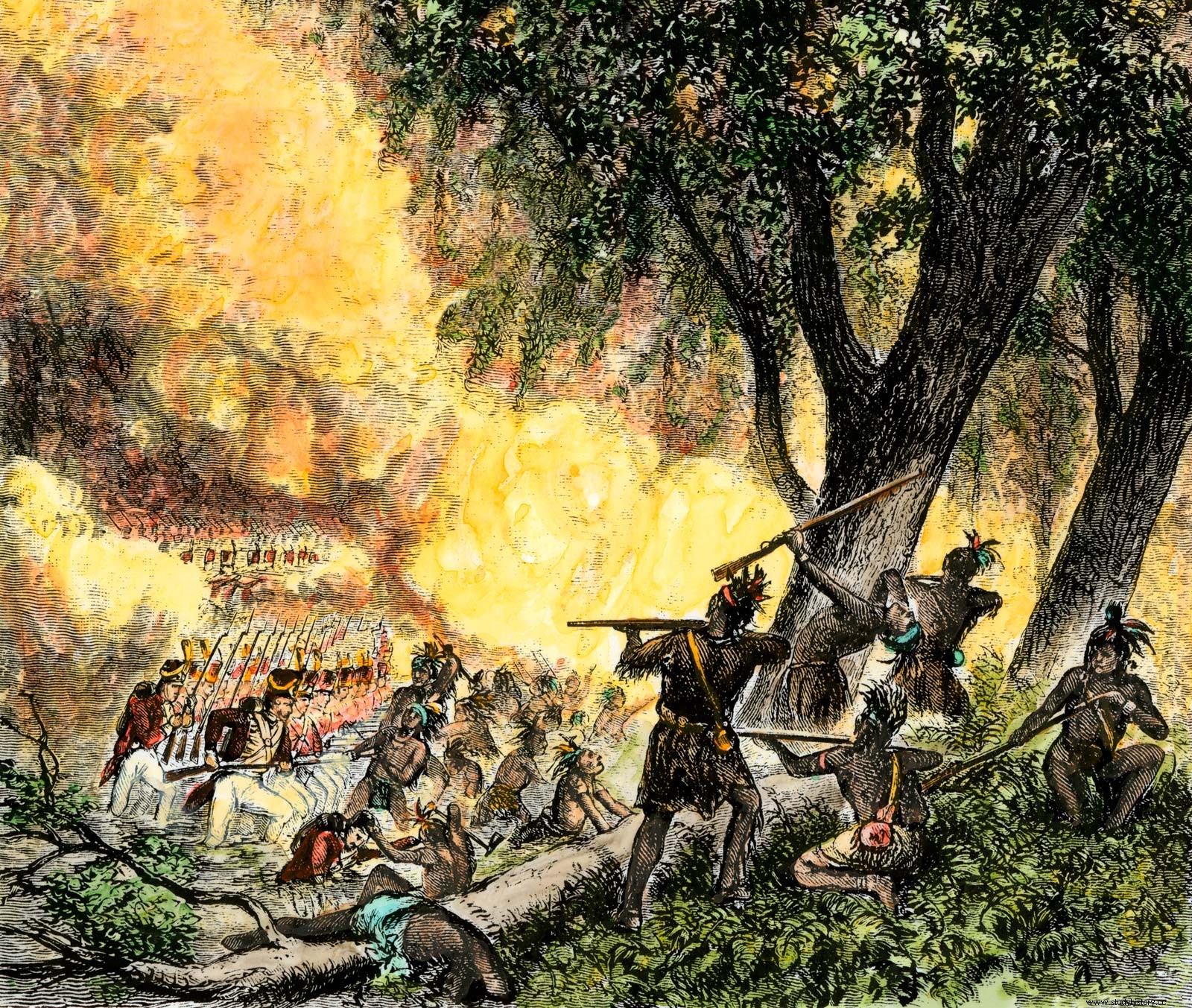
Tecumseh fought with his eldest brother Cheeseekau in the Northwest Indian War from 1785-1795, attacking flat boats along the Ohio River. Fighting alongside Cherokee, Delaware, and Mingoe warriors instilled a Native-first mentality. Tecumseh began to see the land as collectively owned by all the natives. He protested against the idea that one nation could sell land to Americans without the consent of all nations. The idea laid the foundation for his later campaign to secure an independent indigenous nation around the Great Lakes.
He believed that no native would be safe until the threat of European expansion was resolved. Tecumseh fought for the idea that no one could own land, sea or air; The great spirit freely gave these resources to all, and those who lived in the country must freely share them. Capitalist and expansionist, this ideology had little in common with the Western colonialists.
This belief won him the ear of his peers. After Cheeseekau's death, Tecumseh took a more prominent role in the war. He built up an entourage and teamed up with another large band of warriors and British-Canadian troops. Tecumseh had no love for the British, which he saw as another Western occupying power. However, they represented a chance at native sovereignty, and he fought side by side with them, albeit reluctantly. After a British betrayal in the Battle of the Fallen Timbers, the Northwest Indian War ended, and Tecumseh withdrew to the north.
Religious Revival

Many nations, threatened by Western expansion, clung even more strongly to their religious beliefs. Several spiritual revivals swept through the ancient northwest, including one led by Tecumseh's younger brother, Lalawethika. In 1805, Lalawethika received a vision from the Great Spirit and asked him to cleanse the native way of life. He became known as the Prophet, and his teaching gained so much momentum that the brothers founded a village in Delaware County called Prophetstown. Lalawethika called for a return to indigenous traditions, a ban on drinking alcohol, wearing Western clothing and marriage.
The rigor of religious doctrine and their focus on indigenous sovereignty strengthened Tecumseh's vision of an independent indigenous nation. He became head of Prophetstown, and led those who were led in by the teachings of Lalawethika. As the village grew, Tecumseh traveled to other nations to secure his support in the campaign. His reputation continued in many places, and his charisma and strength encouraged many to join him. His rhetoric appealed to the growing fear of colonialism, and he threatened the death of any boss who collaborated with the Americans.
Harrison:A Dangerous Enemy
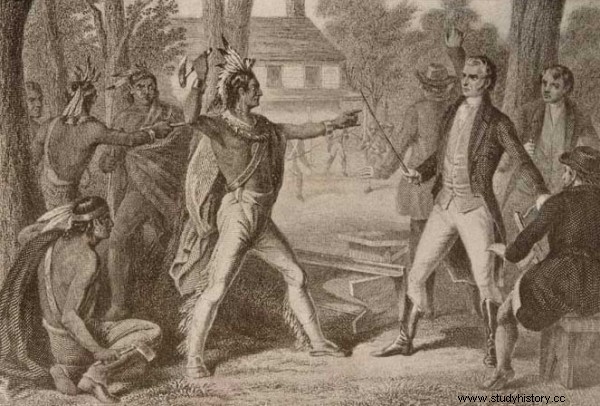
All-out war still hung years away, but the growing popularity of Tecumseh's native confederation caught the attention of William Henry Harrison. Harrison was a career politician and served as senator, governor, representative and later president. He fought in the Northwest Indian War and saw Tecumseh as the greatest threat to the security of his constituents in the Indiana Territory.
His brilliance and charisma matched the Tecumsehs. Harrison convinced several chiefs around Prophetstown to sell the land around the village. Furious, Tecumseh agreed to meet Harrison face to face. The stage grew heated, both men great speakers and deadly warriors. They argued about treaties, native sovereignty and land ownership. The meeting ended in a standoff; Tecumseh swung the tomahawk and Harrison held out his saber. Neither of them attacked, but the two had found each other. Despite the violence that was to come, Harrison spoke loudly about Tecumseh and called him fit to be emperor.
As Tecumseh continued his campaign, Harrison sought to stop the native Confederacy before it had really begun. Knowing that Tecumseh was absent from Prophetstown, Harrison attacked and burned the village and scattered Tecumseh's followers. The momentum in Prophetstown stopped, and the center of the native confederation was torn down.
Loyalty to Britain
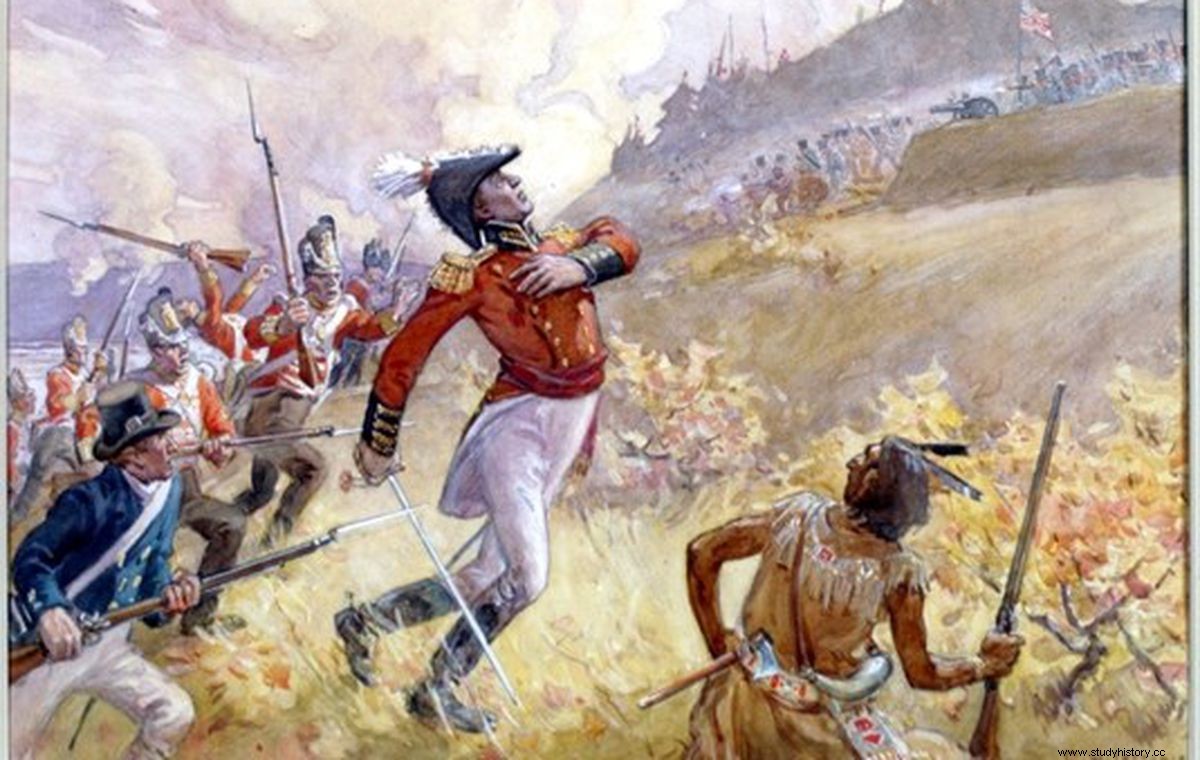
Despite the devastation in Prophetstown, Tecumseh still had the allegiance of several powerful chiefs, and when the war broke out in 1812, he sided with the British to stop American expansion. Major General Isaac Brock commanded the British colonial forces in Canada and was eager to face Tecumseh face to face. The two started an aggressive offensive campaign, using psychological warfare to strengthen the effect of their minority.
In Fort Detroit, the two leaders forced an American surrender without a single native or British casualty. The victory only increased Brock's admiration for Tecumseh, who claimed "a more sagatic or a more gallant warrior, I do not think exists. He was admiration for all who spoke to him."
Unfortunately, the alliance ended when Brock took a bullet in the battle for Queenston Heights. His replacement, General Proctor, did not respect Tecumseh's warriors as Brock had, accusing them of being impossible to control. Tecumseh had little respect for Proctor as well. On one account, under Proctor's guard, American prisoners were tortured and killed on a forced march. Tecumseh had seen the cruelty of American troops as children and did not want to resemble their savagery. Furious, Tecumseh demanded to know why Proctor had allowed the killings to take place, saying he was unfit. Proctor barely filled the shoes of his predecessor, and cowardice led to American victory and Tecumseh's death.
The Last Battle
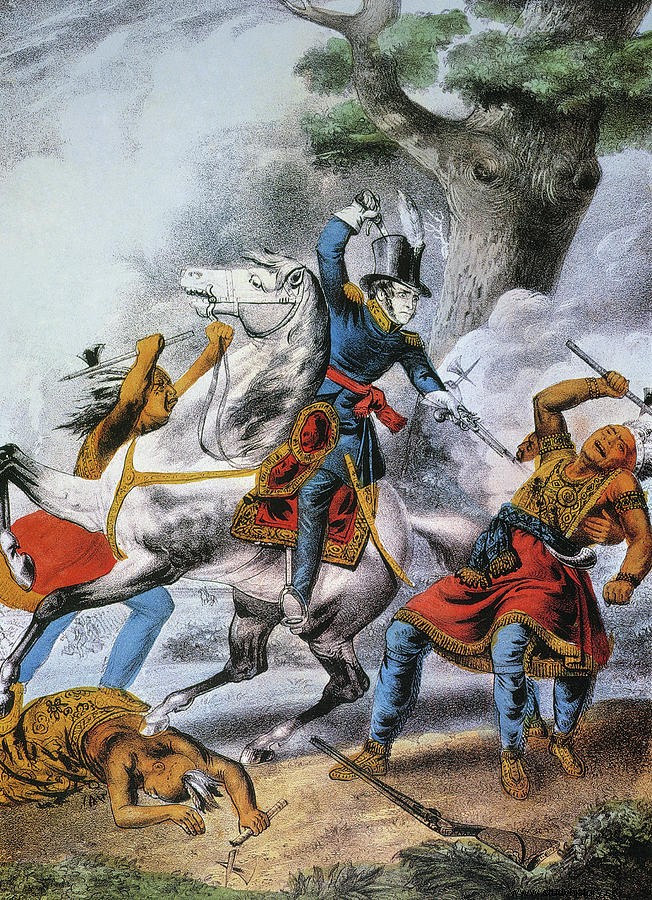
A series of defeats and the loss of Lake Eerie broke Proctor's spirit, and he withdrew to Canadian territory, hoping that Harrison and the US forces would not defy a winter offensive. He was wrong, and Tecumseh's old enemy pushed for the fleeing British forces. Tecumseh, who as a child had promised never to run from the fight, hated Proctor's cowardice and encouraged him to stand and fight.
On October 5, 1813, a starving and defeated British army took up positions near Moraviantown on the banks of the Thames. Tecumseh's forces, now reduced to about 500 warriors, hid in an ash grove north of Proctor. As Harrison's army advanced, Proctor's forces soon disbanded and Proctor himself fled the battle. Tecumseh lasted longer, but American troops numbered the British-native forces three-to-one. An American soldier shot Tecumseh through the chest, and later used the story to win the vice presidency. Without their truly fearless leader, the native forces were disbanded, and several chiefs surrendered the land to Harrison.
The war of 1812 ended with the signing of the Ghent Treaty. Britain weakly claimed Tecumseh's dream of an independent native state as a barrier between the two colonial powers. The US government refused the terms and continued the expansion to the Great Lakes area. Over the next twenty years, the United States would secure its ownership of millions of acres of native land.
Tecumseh's vision today
Current opposition
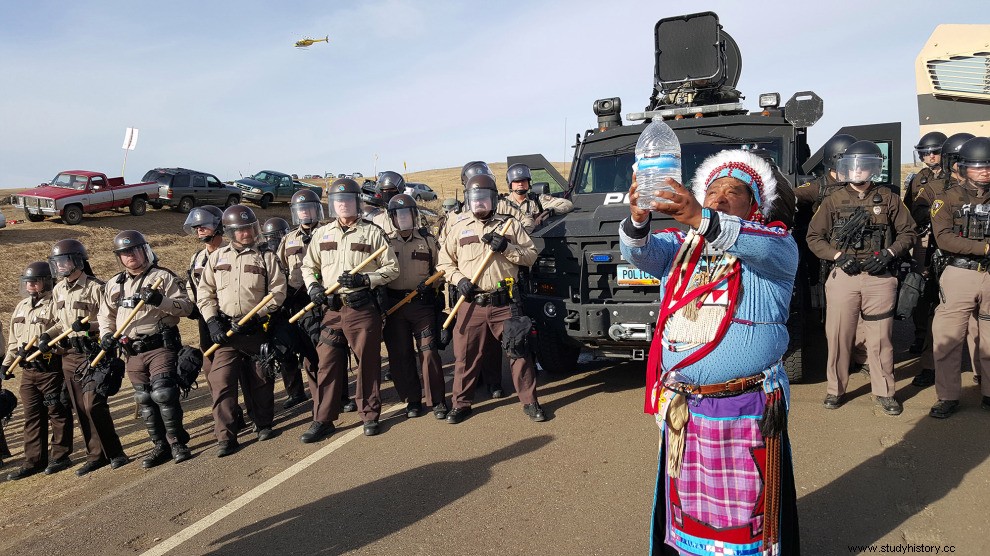
Tecumseh dreamed of native sovereignty. Of freedom from Western oppression and lands where all indigenous nations could live and thrive. More than two hundred years after his death, many indigenous nations dream of the same things. Broken treaties and sparsely veiled genocides make history the relationship between the United States and the United States native. Even in the last decade, members of the Standing Rock Reservation accused the Dakota Access Pipeline of threatening the water supply to Lake Oahe, South Dakota.
Similar concerns surround the construction of the Keystone XL pipeline. President Trump reduced the size of the Bears Ears and Grand Staircase National Parks by 85% and 50%, respectively. He waded through lawsuits that accused him of abusing the Antiquities Act and favored mining and oil companies over indigenous sovereignty and treaties.
Even this month, ignorance of native contributions and history is fully visible in former Senator Rick Santorum's comments at a Conservative youth conference:“We gave birth to a nation out of nothing. I mean, there was nothing here. I mean, yes, we have Indians, but honestly, there is not much Native American culture in American culture. ”
These degrading views of indigenous nations reflect Teddy Roosevelt's own words from a 1886 speech:“I do not go so far as to believe that the only good Indians are the dead Indians, but I think nine out of ten are; I would not like to ask too carefully about the case of the tenth. ”
Moving Forward
Native nations have been fighting against legislation and social bigotry for longer than this country has existed, but in recent years the United States has made progress in listening and responding to the demands of justice. Tecumseh advocated sound governance and respect for the country and the nations that depended on it. At 19 th century, which included designated land for indigenous peoples, proper farming, forestry and land development. Today, it includes concerns about climate change, oil and mining companies overpacking resources from national monuments, as well as new proposals for the management of national parks.
Climate change
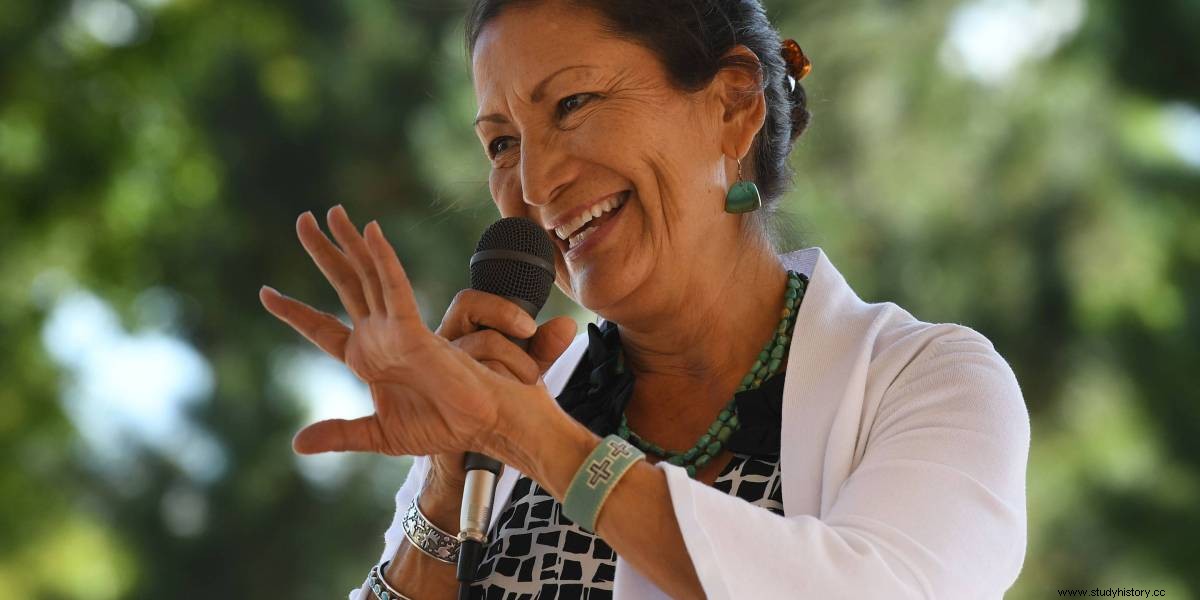
Deb Haaland monitors the country's questions about indigenous affairs and nation-states. Haaland was the first Native American woman to be appointed to the Executive Cabinet, and now serves as Home Secretary (SOI). She is still fresh in the position, and has recalled dozens of Trump-era policies regarding fossil fuels and land use across the country. Haaland committed to the 30 out of 30 initiative early in its term. The initiative, introduced by Democratic Senator Tom Udall in New Mexico, proposes to preserve at least 30% of land and sea in the United States by 2030. Similar initiatives are accelerating worldwide.
Indigenous nations have taken a leading role in the fight against climate change, as advocates for the country for over a thousand years. Haaland is committed to working closely with the historically ignored nations to make climate change a top priority; She created a climate task force to streamline the administration's efforts for climate change.
"How will we feel if we leave this, and we do not take steps to follow the science we know, to learn from the indigenous people who have known what we need by spending thousands of years of observation doing?"
-Sally Jewell, Secretary of the Interior 2013-2017
An Unclear Future
Despite positive efforts to recognize and consult sovereign indigenous nations, momentum is often overturned and short-lived. The status of several national parks and sacred indigenous sites has occurred between administrations over the past twenty years. After being created by President Obama, the Bears Ears and Grand Staircase Escalante parks experienced huge reductions and threats under the Trump administration before being restored under President Biden.
Oak Flat is another sacred place that is now threatened by mining and the government's apathy towards indigenous sovereignty. In 2015, the Nation Defense Authorization Act gave Resolution Copper permission to use a destructive mining technique called blocking to extract copper underground. The action follows a virtually unbroken trend of disregarding native demands to land in favor of gaining and recovering resources. Once again, with the change of administration, the permits to mine the land have slowed down the environmental and cultural review.
A new proposal
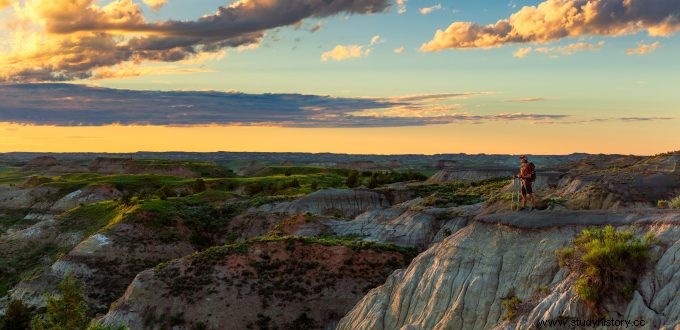
In April this year, The Atlantic published an article by David Treuer entitled "Return National Parks to the Tribes". Treuer provides a thorough background on the idea behind national parks, the violent means of securing land and expanding borders, and the anti-native sentiment and legislation that permeates the history of the park system. Treuer recognizes the beauty and benefits of national parks, and does not advocate the abolition of parks, but instead a change of ownership.
Treuers article:https://www.theatlantic.com/magazine/archive/2021/05/return-the-national-parks-to-the-tribes/618395/
"Indigenous people need permanent, unrestricted access to our homelands - to strengthen us and our communities and to undo some of the damage of previous centuries." Treuer proposes to transfer the management of national parks to a consortium of indigenous nations. Although he says it will not abolish centuries of oppression, "[being] entrusted with the management of America's most precious landscape will be a profoundly meaningful form of restitution."
A sense of dignity
Public access to the parks would not change according to Treuer's plan, nor would fees for construction. What the parks would get, says Treuer, is a management vision formed over thousands of years of connection and dependence on the country. It would restore a sense of dignity and sovereignty to indigenous nations, so often forgotten in the country's laws and social world. The change would also protect the parks from the water in the Executive branch. Providing stable and consistent supervision would allow for a healthier balance between wildlife systems and a unified picture of the history of indigenous peoples in the United States
Tecumseh's vision of a sovereign, separate native nation was never realized, but his thoughts on common ownership, governance, and relations with the country may continue to grow in this country. His rebuke to General Harrison is still true today:"Sell a country! Why not sell the air, the great ocean, as well as the earth? Did not the great spirit make them all for the use of their children? "The voice of all Americans must be heard as we grow to govern our country."
